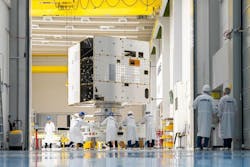Airbus starts production of second-gen Galileo satellites
FRIEDRICHSHAFEN, Germany - Airbus has announced that full production has begun on the six Galileo second generation (G2) satellites at Airbus’ site in Friedrichshafen, Germany, with the arrival of the first satellite flight model structure from Beyond Gravity in Zurich. The panels will be dispatched to other Airbus sites before final integration and testing at Friedrichshafen. The Galileo G2 satellites are scheduled for launch in the coming years to support the initial deployment and validation of the G2 System.
The G2 satellites will incorporate enhanced navigation antennas which will help improve the accuracy of the European Global Navigation Satellite System. The spacecraft, equipped with electric propulsion for the first time and higher-strength navigation antennas, will also feature fully digital payloads that can reconfigured in orbit, enabling them to respond to the evolving needs of users with novel signals and services.
The satellites will also incorporate six - rather than four - enhanced atomic clocks and inter-satellite links, enabling them to communicate and cross-check. This is intended to offer decimeter-scale precision positioning for users around the world. They will be controllable with an increased data rate to and from the ground and equipped with advanced jamming and spoofing protection mechanisms to safeguard Galileo signals. The spacecraft will operate in orbit for 15 years.
The full operational capability phase of the Galileo program is managed and funded by the European Union. The European Commission and European Space Agency (ESA) have signed an agreement by which ESA acts as design authority and system development prime on behalf of the Commission.
"This new milestone is a testament to the capabilities and dedication of the European industry and reaffirms ESA’s commitment to redefine the boundaries of satellite navigation," ESA's Director of Navigation Javier Benedicto said. "I cannot wait to see the many parts come together to bring to life an even better performing Galileo system, so this EU program can continue serving European and world citizens."
